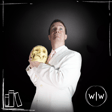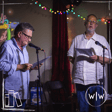Become a Creator today!Start creating today - Share your story with the world!
Start for free
00:00:00
00:00:01

241 Lucas Maxwell | Children's Author, School Librarian and Dungeon Master
Author, school librarian and dungeon master Lucas Maxwell is on the podcast this week to chat about winning the Times/Chicken House competition to publish his debut fiction novel, how table top RPGs like Dungeons & Dragons can benefit school communities and the day to day of a school librarian.
Find out more about IngramSpark: www.ingramspark.com/learnmore
Support the show on Patreon! 💖 And get extended episodes, ad-free and a week ahead of everyone else. 🙏
For audio listeners:
Listen to The Chosen Ones and Other Tropes, Jamie's other podcast with Melissa Welliver and Naomi Gibson! 📚
Follow on socials! 🥳
Transcript
Introduction and Sponsorship
00:00:00
Speaker
This episode of the Right and Wrong podcast is sponsored by IngramSpark. Stay tuned to hear more and enjoy the episode. Ooh, a spicy question. I love it. Because the writing is sort of everything, right? Like you can fix plot holes, but if the writer... So some readers love that and some readers are like, but I wanted more of this. So it's kind of, it's kind of a gamble.
Guest Introduction: Lucas Maxwell
00:00:20
Speaker
Hello and welcome back to the Right and Wrong podcast podcast. On today's episode, I am joined by the winner of the Times Chicken House Fiction Competition 2024, School Librarian of the Year 2017, and perhaps most importantly, Dungeon Master for the Meat Shield D&D podcast, it's Lucas Maxwell. Hello.
00:00:40
Speaker
Hello, thanks for having me. Thanks so much for for coming for coming on and chatting with
Lucas's Book: Roll for Adventure
00:00:44
Speaker
me. um Let's start as always with whatever the latest or upcoming publication is. And that is going to be Roll for Adventure, your second nonfiction book about tabletop RPGs out August 21.
00:01:02
Speaker
Tell us a little bit about it. Yeah, thanks. So ah it's role for adventure is basically aimed at teachers, librarians, parents, even students, to be honest, um who want to get into games like Dungeons and Dragons, but maybe feel a little overwhelmed with the rules or don't have a lot of time, especially for school staff, time is is a big issue.
00:01:27
Speaker
And what I've done is created five kind of plug and play little adventures that are step by step, tells you exactly what to say, when to say it, all the different kinds of scenarios you can get, what to roll, when to roll, how to make it fun.
00:01:41
Speaker
And on top of that, a bunch of resources that can hopefully make it a little more engaging and fun and easy to just jump in and play without having to spend hours and hours creating characters or learning the rules. So um based on my kind of experience with other librarians and teachers who said, oh, I'd love to start one of these programs in my school, but I just don't have the time or I find it kind of overwhelming. So that that was kind of the inspiration for it. Yeah.
00:02:09
Speaker
Okay.
Educational Benefits of RPGs
00:02:10
Speaker
And this is, um i've seen reading a bit about you, this is something that you're kind of very much an advocate for, like, the development of people through games like Dungeons and Dragons or whatever tabletop RPG it is.
00:02:23
Speaker
What is it that you think that these kinds of, yeah i want to say games, but you're kind of using them as more than a game. What do you think this kind of, white why is this so great? why what What is this providing to, you know, teachers, librarians and students that are like,
00:02:38
Speaker
What I've noticed is it's a game that has a less staying power. And I've been working with youth in libraries for many years now, about 15 or 16 years. And it's a game or it's a program really that I've never seen another program like it that have that this kind of impact. So um students who join it, a lot of them become really good friends and they never want to miss a session.
00:03:05
Speaker
and they develop public speaking skills. They develop ah a lot of social skills. they Through this game, they become I've seen them grow in confidence.
00:03:16
Speaker
I've had parents tell me that Dungeons & Dragons is essentially the only reason their kid will go to school. I've had so teens tell me that it got them through high school. I mean, there is a flair maybe for the dramatic with maybe some of this, but I've had students tell me, look, this game has literally saved my life coming to school, dreading going to school. And speaking to um ah with My other ah book about Let's Roll, my first book, I spoke to a bunch of um mental health professionals in the United States about using D&D as a therapeutic tool. And I do charity work for Game Therapy, which also does this. And
00:03:56
Speaker
It's um one big aspect is something that they call ah behavioral activation, which is like a medical term for essentially having something to look forward to. And they know that twice a week at lunch or after school, we're going to have this game set up and they could be themselves, be in a safe place, be with their friends, not have to worry about anything and just have a lot of fun. So that's the big thing. It's just ah the amount of fun that they have.
00:04:22
Speaker
And it's been amazing to see them kind of grow with it. Yeah. Okay. That's really interesting. Yeah. Cause I guess I, I've, I have and continue to play a lot of TTRPGs and there is, I can see what the psychological angle would be where it's, um, it takes a lot of the pressure off, but you can still do serious things like yeah writing fantasy. I think fantasy and sci-fi are often stand-ins for the real world, but but authors can explore topics that would be much heavier if they were to do it in a contemporary setting and that kind of thing.
Game Setup Insights from Lucas
00:04:55
Speaker
carries over to dnd and stuff okay yeah and you mentioned the first one let's roll is this new one ah continuation of that one or like would is it best to have have read the first one before the second one or you don't need to have let's roll was more uh is more um setting up how to set it up uh okay how to get a game going how to get, get maybe a senior leadership on board, what you need to do, ah what the game is about and how I run it in a, in a setting where you might have 45 minutes to an hour where in quote unquote, you know, regular world d and D session, as you know, might be four to six hours long and it's hard to hard to do.
00:05:37
Speaker
So different things you can do, especially working with youth as well, different safety tips and things like that. Um, So then what I decided was, well, why not make ah pitch another one where it's basically all just plug and play adventures because that's kind of what a lot of the people I spoke to, okay, now I've got it set up. ah They might buy a campaign book or look online but still feel a little overwhelmed. So I thought yeah here's here's some one here's some really quick adventures that –
00:06:09
Speaker
It's really hard to say like, oh, this will take under an hour, but because you just don't know how things will go. But essentially they're written in a way where they're very short and they're very clear.
00:06:20
Speaker
And it's aimed at people who'd never have been DMing before, been a dungeon master before, and they're working with youth, um which can get chaotic. And also like how to run it if you have a big group, because I've run it with groups of like 10, which is very, can be very chaotic.
00:06:37
Speaker
I know. Yeah. That's not ideal, but. i It's a lot. But um I've also done it in settings where I've had like 50 to 100 people and I've just made like, okay, a table of six is going to be a character.
00:06:50
Speaker
And it worked really well, actually. Yeah, was in the Barnes Literary Festival. But it's you have to just streamline everything and kind of like just little tips and things that I've learned over the last like eight years or so being a dungeon master. I'm no expert, but I'm just constantly learning and just trying new things.
00:07:07
Speaker
Yeah. Yeah. Yeah. And my experience with Dindy is that it's also about, it's always going to be different depending on who's sitting around the table. So it's... Oh, 100%. Yeah.
00:07:18
Speaker
In terms of, and and you touched on it, but if I, you know, if one of my friends expresses an interest in in trying to play something like this with me, and I have obviously a group of friends that that have been playing this for a long time, they know how the the game works and stuff.
00:07:33
Speaker
ah You know, a so a sticking point can be that people are intimidated by the rules and things like that. Have you created it like a ah kind of streamlined rule set? Is it like a simplified version of the kind of bigger systems?
00:07:45
Speaker
um For the book, I basically have ah streamlined it, set it up like ah kind of like a generic tabletop role-playing game. just to make sure things go smooth. I mean, what our students, what what teachers may find, and again, every group is different, but our students love creating characters. So that's something I just left out because that can take hours and hours and that's something you can do on your own. And they can and once i work it out, you know I do like whole programs just on character creation and things like that.
00:08:18
Speaker
yeah, I basically have pretend trying to imagine someone who's never been a dm and they jump into the book and okay what do these dice mean basically and what do they roll and win and basically just try to streamline everything um and introduce little scenarios and if they do this you can say this if they do this you can say that and of course they can say whatever they want but here are some options to do and it's full of random tables which our our students absolutely love so and they're like silly stuff so if they uh there's one where they have to fight like a giant uh uh scone that's become like uh sentient and it kills like it swallows the baker that you know still things like that but the jam from the scone is cursed and i create this table where if they touch or interact with the jam this is the different things that can happen
00:09:09
Speaker
to them. They love random tables. They love rolling D100s and seeing like silly things that can happen to them. And that's a lot of that stuff. ah Yeah. You'll find kids want to pickpocket everything. So I have a D100 table that I created of things that can happen if they try this stuff, because sometimes there should be consequences, funny consequences to their actions and things like that. So the book's full of tables.
00:09:31
Speaker
Tables and tables. Yeah. tables yeah Yeah. I mean, yeah. Everyone loves rolling a big dice and seeing what the random thing is that happens. Yeah. So it's a lot of that. So you said that it is targeted to teachers and librarians primarily, but also the students. and so and it sounds like,
00:09:48
Speaker
You have done a lot of the DMing, but do you try and at a certain point be like, oh, does someone else, you know, does one of the students want to DM for a session? and and And for anyone
Encouraging Student Leadership in RPGs
00:09:57
Speaker
listening, that basically means like you're the narrator, you're the person who kind of takes charge of the story.
00:10:02
Speaker
So do you do you try and look for ways to to get one of the students to stand up and do that role? Yes, so I lead little sessions on, lot of them learn by just playing, of course, and and watching. What's interesting is that um when we play it in the library,
00:10:19
Speaker
We might have six or seven kids playing and we might have 15 to 20 kids watching, which is very interesting. and And I will ask them, do you want to play or do you want to join? they Usually they just don't want to, they just want to watch. But some of those kids have become DMs on their own.
00:10:35
Speaker
And I will kind of like lead little sessions to just get them ah get them started. A lot of them do become DMs. Dungeon Masters, we have tons of little splinter groups that just come to the library after school, before school even, to just play and learn and read the books and things like that.
00:10:52
Speaker
And my my big advice to them, i mean, again, i I just try to say, like don't you don't need to worry about anything. you know The rules are there as a framework. Yes, there are rules, but make a mistake,
00:11:05
Speaker
Who cares? you know It doesn't matter. yeah It doesn't matter if you make a mistake. Unless it's you know let's another player is becoming really upset. And yes, take of course, take some time and make sure everything's going. you know you You are following the rules and you want to make sure everybody's happy at the table. But at the same time, you also um these rules don't really matter. Use the DM can can just go with the flow. like i so I always tell them to...
00:11:30
Speaker
to not stop to pour over the rule book for hours to work out you know the the damage of a certain object or anything like that. just like Just you know make it up if you have to.
00:11:43
Speaker
um There's nothing wrong with that, and in my opinion, especially in a setting where time is your is your enemy. So my big advice to them is just to not make it too complicated. A lot of them want to write their own adventures, and it's to make it as simple as possible and then because it will get complicated on its own. player Yeah.
00:12:01
Speaker
Do the player's actions. And and the ah the other big rules, as you know, is like, if you try to railroad, it will always go wrong and you will be disappointed as a DM that they didn't do what you thought they should do or wanted them to do.
00:12:13
Speaker
And to me, I've been running this, um I've been DMing the Meat Shields podcast for three years now. And um Every Monday we release a new episode and it's like ah the best moments are the ones where they just go completely off the rails and I don't have a clue what to do. And those are the funniest moments. like god yeah yeah Like the last episode, our wizard put an immovable rod in the midair and and well on an airship. and It cut the airship basically in two pieces because she forgot that it's an immovable rod. It's like sitting in midair. yeah One of those things.
00:12:49
Speaker
And it was hilarious, you know, the airship. flew apart. And it was like, here we go. Okay, now I had no concept of how to like, DM an airship splitting in two pieces and crashing to the ground. I just had to like work it out. And yeah, it's it's hilarious. They loved it. So anyway, yeah, those are the great moments when even you are like, Everyone's on the same footing because the players know what's happening and you as the DM in charge also don't know what's happening. So everyone's just kind of trying to figure it out.
00:13:15
Speaker
um So I was going to, I mean, you went into it, but I was going to ask. Yeah. You're saying that a lot of the students end up wanting to write their own adventure. Do they, have they at any point wanted to sort of um take it out of D&D and actually start writing prose, you know, writing a story? What could potentially be, you know, a short story or a novella or even a novel?
00:13:38
Speaker
Oh, wow. um I've had a few kind of, lightly broached that topic with me one of them wrote a um a 6 000 word dissertation on um how dnd helped their mental health uh for like uh extended project qualification and um kind of presented it to me which was amazing i you know it was really great to see um and it was just nice that that was someone who uh at the very beginning stages was someone who was like would just only watch and wasn't like didn't speak really at all. And then to see them become a dungeon master over like period of two, three years um and create their own adventures ah was really amazing. So we've got about three three or four students now who um are writing their own adventures really in very like, I'm always amazed because I try to do homebrew stuff. I rely a lot on the pre-made stuff, but
00:14:30
Speaker
the homebrew stuff I try, i just don't have the time. And i'm always amazed at how, um, detailed they are. And so they are writing, yeah they wouldn't be considered novels or novellas, but they are, they are these little stories. We did these, um, uh, these amazing, we're doing another one in October, these amazing events at the British library where our students have written adventures aimed at neurodivergent, uh, uh, students, uh, and it's open to the public for free at the the British library. And our late next one will be in October.
00:14:59
Speaker
Um, And they closed the exhibit down for for us and we run it. ah It's completely written by the students. And the lot they the last one they wrote was aimed at, the theme was medieval women. So the idea was they had to say save Joan of Arc and it was really cool. It was just so...
00:15:18
Speaker
It was amazing. And they wrote all these little traps and puzzles. They had to save her from this from the from a dungeon. And ah you know it took about four hours. it was so cool was to see people. it was completely book solid. And we ran it from like 4 p.m. to 8 in this beautiful setting and with all this stuff, like with Joan of Arc's actual, you know, diaries on display around us and things like that. Yeah, it was really cool.
00:15:42
Speaker
And they do, they do a ton of writing. And that is the thing that I always say when I, so when I'm lucky enough to speak to teachers and other librarians is that the game has these, they the, the, the program has this kind of,
00:15:55
Speaker
um side effect or this kind of side route that I didn't expect where the students are doing, a they're doing a ton of reading and a ton of writing, creative writing, and they're not really, maybe not, I mean, sure they're realizing it, but they're but're not seeing it as a chore or anything
Supporting Independent Authors with IngramSpark
00:16:10
Speaker
like that. It's just, they're being so creative with their with their, um, their homebrew writing. It's, it's really amazing to see. And they, and I love to see what they, what they, what they create. Yeah.
00:16:20
Speaker
That's awesome. Yeah. You're kind of opening up new creative avenues for them that they probably didn't expect that they would be interested in, but then sort of accidentally fallen into it through this. That's great. Yeah.
00:16:32
Speaker
If you're thinking about publishing your own novel, if you have a story that's ready to be shared with the world, then look no further than IngramSpark. IngramSpark offers everything you need to publish, promote, sell and print your book.
00:16:45
Speaker
You'll be able to reach millions of readers worldwide with powerful tools created specifically for independent authors. And you can get started for free at IngramSpark.com forward slash learn more.
00:16:58
Speaker
And speaking of being a ah librarian, a school librarian, um i think one of the most unsung roles in publishing, being a librarian, it often feels like a taken for granted role. So I'd love to know, i mean, outside of the D&D stuff, which we've covered, yeah what is your what what is your kind of day to day duties as a school librarian?
00:17:20
Speaker
Oh man.
A Day in the Life of a School Librarian
00:17:22
Speaker
Uh, that's a good question. So I opened the library. I wrote a, um, uh, thing for this recently and I, it made me think it it was a good question. It's a good question because it it does make you kind of reflect on, um all the things that happen in a, in a daily basis on a daily basis. Uh,
00:17:40
Speaker
Essentially, I mean, opened the library up very early around 7.15 and there's students waiting usually, and which great. And then um we're open all day long and they can be in there till school starts and then break and lunch and then after school.
00:17:53
Speaker
And my daily job for me is as the kind of the manager is i run library lessons. So I'm really lucky that the English department um for the last, i don't 11, 10, 11 years has asked me to lead library lessons for year sevens, eights and nines.
00:18:11
Speaker
So they'll come in. So an English class will come in once every two weeks. um But because there's seven eights and nines, they're in all the time. And I spend the first 15 to 20 minutes doing readers advisory. So just helping them find new books if they need them.
00:18:25
Speaker
and we And we read for about 15 to 20 minutes. I'm always promoting this kind of like 20 minutes a day getting some reading done good for the brain good for the soul and i read with them so it's like model so i'm not just standing there over them um i'm kind of sitting down i'm in the tables you know reading something as well and then we'll kind of like have a discussion and i'll promote books as well or promote events and then the last 20 minutes of the lesson we'll do a literacy kind of based activity we might go on the um on the computers and um do some work on becoming responsible kind of digital citizens or learning how to navigate misinformation and fake news, which is a huge kind of passion of mine and something that is
00:19:07
Speaker
terrifying to me at the same time about the future of this, how I don't, you know, I don't know how we're, we're going to equip students with this kind of mental ah ability to do this so or myself really, because it's so difficult now. But so that's kind of like how I split these lessons.
00:19:21
Speaker
And then, Break time might be is just basically helping kids find books, helping the student library assistants with their job a bit. um Lunchtime usually is running a program. Maybe I'm running Dungeons and Dragons or might be running our comic book manga club, book club, of course. We do a monthly open mic with the music department, which is massively popular. Those are at lunchtime. We run a monthly film club.
00:19:44
Speaker
where we watch a film based on a book. um We have lots of author events. So authors come to the school and we do tons of promotion around that and getting kids to buy books, get them signed.
00:19:55
Speaker
um I do a lot of little one-off activities where like the British library thing, which is really cool. Our D&D team is also launching ah a It's called Imagined World. It's a new D&D event ah for Lewisham Public Library System.
00:20:10
Speaker
And so we do lots of like little events around that. We interview people. We have a little little library podcast. So my day-to-day is extremely busy. and It's also, but it's a lot of fun and I love it because you never know it what to expect and we get to do these little kind of unique things. I'm always trying to put feelers out there to to try new things and do different things. So it's um it's very changeable, but it's a lot of fun.
00:20:37
Speaker
Yeah. Wow. It sounds busy, but also eclectic. It's never, never the same thing every day. um And you mentioned you're kind of like choosing books and kind of suggesting books to to the children.
00:20:51
Speaker
Yeah. What, where are you kind of like, a are these all books that you've read or are these books that you've read some of them and maybe like your friends who are also librarians or whoever it might be have have said, Oh, this would be a really good book.
00:21:02
Speaker
how How are you choosing which books to kind of say, Oh, I think this would be good. This would be good. That's a great question. I read, obviously, i you have to read a ton and that is part of the job description, but you don't have time during the day to read, really sit at the desk and read. I wish I did. But so a lot of my life at home at night is reading books. So try really hard to promote books that I have read and that I genuinely enjoy. If we have an author event,
00:21:31
Speaker
And it's a book that I haven't had time to read. i will get the gist of it and I'll promote it to death around the school. I mean, just absolutely. Letters home, traveling. I i do a lot of like mobile um library outreach. We have a nice size library and it's extremely busy, but I will also visit classrooms and do a lot of stuff like that. i also do a lot of...
00:21:53
Speaker
um from ah context lessons for different departments but to promote a book i do try to read it and i i promote a lot of graphic novels uh because a they're quick quick to read and i'll fly through one of those maybe in a library lesson i will fly through one of those at the beginning if i can find a short one and i'll go oh this is really cool but i have no problem promoting a book that i've read half halfway through say this is a really great book and i The thing is with with students because it's a secondary school, it's ages 11 plus and we serve ages 11 all the way up to 19 years old.
00:22:24
Speaker
right um They can see through ah any kind of like me trying to fake it. So i I'm trying to be honest with them. And I would just say, look, I haven't read this book, but here's the blurb. Some of you might really enjoy especially – I do that a lot with murder mysteries because they don't need a lot of promotion to be perfectly honest.
00:22:44
Speaker
um They just fly off the shelves, which is, you know, the way it works. And they are really popular thrillers, murder mysteries that are aimed at like 13 plus. And I'll go, Oh, this just came in. This looks cool. If anybody wants to borrow it, it's about this. but but I'll read the blurb or I'll read the first page if I think it's cool.
00:23:00
Speaker
um So yeah, there's many different ways I do it, but generally i do try to read the book. So I read, ah I read a ton at home. Yeah. Yeah, sure. And obviously thats so that's a big age gap, 11 to 18, 19.
00:23:14
Speaker
and eighteen nineteen Oh, it's huge. Different books specific to different, you know, like a 19 year old isn is reading very different things to an 11 year old. Oh gosh. Yeah. Yeah. For sure. Yeah.
00:23:25
Speaker
yeah I mean, you've got your work cut out for you on picking that, but i that's also, I bet, rewarding when you... have like if it's on an individual basis and you find a student and you're like this book would be great for you and then that really like resonates with them I bet there's few things more rewarding than that That is the big thing. when you When you kind of get to know student, and that's another part of the big part of the job is to it's just to get to know as many the students as you as you can. I mean, we have a school of around 1,800, which for me is massive. I mean, coming from a Canadian school system where we had very, very few students. And to also get to know their you know their interests, um also meeting students
00:24:10
Speaker
For me, again, coming from rural Canada where there wasn't maybe a lot of diversity, I am now in a South London school where I'm meeting students from every walk of life, which to me has been amazing because I've learned a lot and it's been quite an eye opener for me to meet students of different different backgrounds, different religions, different countries.
00:24:29
Speaker
And to yeah to be able to bring in, um maybe bring in books that are written in different languages, maybe bring in books, of course, that um are seen from the viewpoint of someone ah from a different religion or a different, just different country is um been a quite, ah like I said, an eye opener for me. And the other thing that I've noticed, well, that I've learned is that in the UK,
00:24:55
Speaker
I mean, it's gotten better, but a few years ago, um books published for students you know ages 10 plus um in the UK that less than 1% would have a character that wasn't a white, straight white person.
Diversity and Author Engagement in Schools
00:25:13
Speaker
So that was a huge eye-opener for me when i read that report from Book Trust. And I've done work with Book Trust since and um been doing a lot of stuff with them and other charities. And I've seen a big in a big improvement to that.
00:25:28
Speaker
And that's been really fun to, again, connect students, ah who maybe are neurodivergent as well to find books that are written with their voice. They, um, it's made a big difference. Um, I think just to be able to, and it is a great feeling of course, but it's, uh, it's made a big difference I think to, to them to see that somebody's there to build a collection that reflects, you know, their, their lives. So yeah, it's been great. yes Yeah.
00:25:58
Speaker
And like creating it on almost a personal level, I'd imagine like people who come to the library often you're like, you you'll have them in mind specifically with certain books, which yeah absolutely which is great for them.
00:26:10
Speaker
Before we head to the desert island, the last question on this I wanted to ask was, you mentioned you have author events and things like that. I know a lot of my friends are authors or like do school visits and trips like that.
00:26:22
Speaker
How do you connect with the authors? Do you reach out to them or do they reach out reach out to you? um It's been a mixture of both. I've been really lucky over the last maybe five years or or more that publishers are now reaching out to me to say, hey, we've got a new author or debut author or an author has a new book. Would you like to host them?
00:26:40
Speaker
And I'll, of course, jump on anything like that. I will also simply use social media to say, what's going on? would you like to, uh, visit the school sometime? Uh, your book is really popular. And my experience has been 99% of the time they'll be like, yeah. Or, you know, if they're really far away, especially if we have ones in Ireland or maybe America, um, they might do like a virtual visit, which is really cool still. But, um,
00:27:04
Speaker
Yeah, i mean, social media has been amazing just to reach out and go, hey, ah they might then they might direct me to ah to their agent, not their agent, but their publisher or authors allowed or something like that, where they'll connect me the correct avenues.
00:27:17
Speaker
I do everything kind of, I do everything like on the fly and not the greatest organizational way to do it, but it has worked for us. We've had but ah lots of author events and they they always go really smoothly. Yeah.
00:27:31
Speaker
touch wood but yeah that's i'm I'm all over the place with it but I just I just like to to be honest it's like if I really like a book I will reach out to the author and go well this would be great and that's you know and or if a student is really one of our first author events was Holly Bourne many years ago and that was because and I wasn't ah really aware of her work but that was because we had a group of students maybe five or six students who would not leave me alone allly born And it was, it was really great to bring, bring her in and these students, you know, melting in front of her. It was really cool.
00:28:05
Speaker
Okay. Yeah, that's great. So if there's any children's or YA authors listening, listening, who were interested in this kind of thing, that they're good to just reach out to you Of course.
00:28:18
Speaker
Anytime on social media. Oh my gosh. Yeah. Yeah. Please. Amazing. um So we are at that time where I, Pack up all your things and ship you off and ask you, Lucas, if you were stranded on a desert island with one book, which book do you hope that would be?
Desert Island Book Choice
00:28:37
Speaker
Yeah, this is I don't know how other people on this show do this.
00:28:40
Speaker
This is so tricky because i get asked a lot by the students. What's your favorite book? And I i kind of have two in mind because. And I'm not allowed to do that because I'm not allowed do that at all. but Because one of them is like, quote unquote, kid friendly and the other one isn't. But I will choose just, I'll just be honest and choose my, I mean, they're both my favorites. But when I'm thinking of students who are 11, always go one book. And then i when thinking of like adults, I'll go the other, if that makes sense. But yeah. um It's just the way my brain works. But ah um I'm going to just be honest and choose the one. And it's one I reread recently. And it's called um Blood Meridian by Cormac McCarthy. Now, it's more popular in the UK than I expected. be Honestly, i met a lot of teachers who were like, oh, yeah, yeah, I know that book.
00:29:26
Speaker
And I'm like, oh, OK, cool. Maybe it's not so unique. But yeah. that and i very There is like an asterisk next to when i when i put this out to the world because this is not a book for everybody in my opinion. There are things in that book that people don't want to put in their brains. It's extremely violent.
00:29:43
Speaker
um But it is a book that I don't know what it is about it. It's something – I feel like he wrote it in some kind of like fever dream book. hypnosis state where it's just like, seems like I think of Jack Kerouac writing on the road on one big long scroll. And it seems like he's done that with this book.
00:30:01
Speaker
um To me, ah being someone who grew up fascinated with the old West, fascinated with the United States, with my family, most of my family being from the United States, even though i grew up in Canada.
00:30:13
Speaker
um This is a book to me that is some kind of bizarre modern classic with probably the most terrifying villain in literature, in my opinion, this Judge Holden guy who was based on a real man.
00:30:27
Speaker
And the fact that it's based on real events is also bizarre to me. um I don't know. Have you read Blood Meridian? sounds like you have. I've not read it. I have it. I have two copies of it, actually. And I've attempted to read it a few times.
00:30:40
Speaker
this i will read one day. I'm not, you know, again, be prepared. It's so yeah it's so over the top violent. um Because it's essentially, if people are actually, i won't go into detail at all, but...
00:30:56
Speaker
this and This is true. So in the 18, I believe, 50s or 60s, the United States government in the southwest the United States would hire groups where it would put out group you know bounties or things like that and put out advertisements to say, look, if you collect...
00:31:15
Speaker
um you know if you collect scalps, as this is disgusting, but if you collect scalps, we will pay you scalps of First Nations people. This is part of the brutal kind of American takeover of the of the of the West, ah just the decimation of the First Nations people.
00:31:33
Speaker
And it's awful. and And so groups would go, oh we'll we'll do that. But what this one group did, and it was kind of like historically tracked, was that they decided, well,
00:31:45
Speaker
how are, how are they going to know what, whose scalps these are belong to? So they just went down into Mexico and went on a rampage and it is awful, but it is this kind of bizarre.
00:31:57
Speaker
um There's this guy in the book, Judge Holden, and he's written in historical records as this like almost seven foot tall monster of a man who just had no morals.
00:32:08
Speaker
And um the book is like a testament to um the creation of America really. Cause they kind of, They kind of took over the Western half of America using a lot of these methods, which was absolutely awful, but it's written in such a beautiful, strange way ah with no speech marks or anything like that written throughout. There's a lot of, there's paragraphs that are a page long.
00:32:32
Speaker
There's no breaks in them. And I, I just, for me, that kind of connected that style of writing connected with me. So this really, I, I, was affected by the book and I read it way too young and then I've come back to it many, many times. Again, I'm not recommending it really, but it is a book I would take with me. And the reason why I would take with me, I've taken a very long time to get to this point, is because it's a book that every time I read, I feel like I'm missing something. feel like there's some kind of message in this book.
00:33:04
Speaker
Yeah. It sounds bizarre, but that's what i that's why I would take it. Cormac McCarthy is one of those authors, though. I mean, he'll he'll he died only a few years ago, but he'll go down in history as one of the all-time masters, I think, because he's one of those authors where you you you you're like, I'm understanding like one or two things here, but I'm pretty sure there's about 20 things that I'm missing.
Episode Conclusion and Promotions
00:33:26
Speaker
Yeah. I mean, look, if you want to just put The Hobbit, I'll say The Hobbit. Was that your other one? that was you well Or Watership Down. I mean, they're amazing books. I just like, yeah.
00:33:39
Speaker
Bob Meridian did something to my brain. I can't get away from it. But anyway. Yeah. No, i know what you mean. I feel that way also about, in terms of authors, I feel that way about Alan Moore when I read an Alan Moore graphic novel. And I think...
00:33:52
Speaker
I'm, this is so astoundingly intelligent and I'm pretty sure I'm only picking up like the smallest amount of what's actually done. I i agree with the Alan Moore analysis. Yeah. A hundred percent. um Amazing.
00:34:04
Speaker
That's well a great, I mean, Blood Meridian, I think is one of the most highly regarded books. Whether I think it's one of those books where a lot of people it's like, I didn't like it, but I, it was incredible.
00:34:18
Speaker
Yeah. i know what i mean that's i agree yeah and i don't recommend it to people really because of that yeah because of it's so brutal but yeah i agree that statement for sure yeah that's exactly how i feel about 1984 as well i feel in the same way yeah and i'm you should read it but yeah i don't like it and i don't recommend it it's pretty very depressing there's um um Okay, so next up, we're going to chat a bit more about writing and a bit more of the craft parts of things. We're going to talk about the Times Chicken House competition and everything that's going on with that.
00:34:51
Speaker
You can find all of that in the extended episode available on patreon.com slash right and wrong. So modern kind of teenage sarcasm is a really fun.
00:35:04
Speaker
And the but theyre the nicest kids I've ever met my life, but they they definitely, some of them, you know, they have sharp tongues with each other. it' It's fun to kind of like watch them interact for sure. Yeah.
00:35:15
Speaker
Okay. Okay, great. That's awesome. That's really great to hear. And that brings us to the end of the episode. Thank you so much, Lucas, for for coming on the podcast and telling me all about your your um adventures with Dungeons and Dragons, as well as obviously,
00:35:31
Speaker
the novel and your writing and your work as a librarian. It's been it's been really great chatting with you. It's been an amazing, great question. It's been absolutely amazing to be here And I want to thank you for the opportunity. Thank you. Now, of course. And ah for everyone listening, Roll for Adventure, Lucas's new Dungeons and Dragons um nonfiction book.
00:35:50
Speaker
Well, I shouldn't say Dungeons and Dragons. It's probably not brand affiliated. It's a tabletop RPG nonfiction book. It's out. on the 21st of August. And if you want to keep up with everything Lucas is doing, you can follow him on socials at Lucas J Maxwell. To support this podcast, like, follow and subscribe. Join the Patreon for ad-free extended episodes and check out my other podcast, The Chosen Ones and Other Tropes.
00:36:12
Speaker
Thanks again to Lucas and thanks to everyone listening. We will catch on the next episode. Shout out time. One of my amazing patrons, Lee Foxton, is querying their debut novel. It's a family drama, commercial fiction along the lines of Jojo Moyes and David Nichols.
00:36:29
Speaker
Fingers crossed. I am rooting for you. Good luck.



















